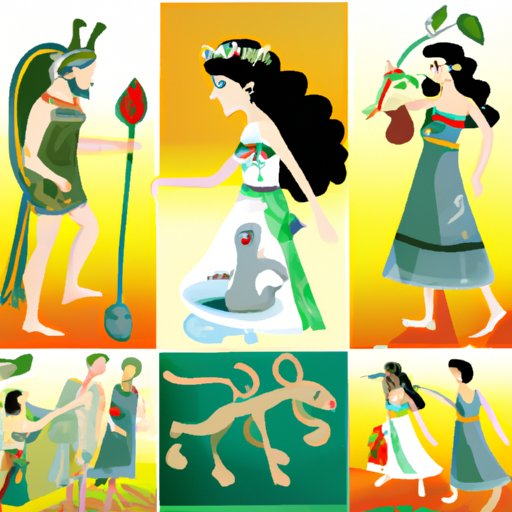Introduction
Myths are stories that have been passed down through generations and are meant to explain a certain phenomenon or provide an example of a particular moral lesson. In ancient Greece, these tales played an important role in forming the culture of the time. This article will explore why myths were important to ancient Greek culture and how they shaped social norms.
Examining the Role of Myths in the Formation of Greek Culture
Myths were used by the ancient Greeks to explain natural phenomena. For example, the myth of Prometheus explains how fire was brought to humans by the Titan, who stole it from the gods. This story served to explain why humans had access to fire, which was seen as a divine gift.
In addition to providing explanations for natural occurrences, myths also provided moral instruction. The gods and goddesses of Greek mythology were often used to illustrate how people should behave in certain situations. For example, Zeus was seen as the embodiment of justice and good judgement, while Athena was seen as the goddess of wisdom and knowledge. Through these tales, the ancient Greeks were taught how to behave in order to be accepted in their society.
Myths also helped to unify different Greek city-states. Stories such as the Odyssey and the Iliad were shared by all Greeks, regardless of where they lived. By having a shared set of stories, the various city-states of ancient Greece were able to come together and form a common culture.

Exploring How Myths Shaped Social Norms
Myths were also used to shape social norms. Many of the tales featured characters who faced difficult decisions and had to choose between right and wrong. These stories showed what happened when someone made the wrong choice and illustrated how important it was to follow the rules of society. For example, the story of Oedipus Rex shows the consequences of breaking social taboos, such as incest.
Myths were also used to pass on cultural values from generation to generation. Tales such as the Labours of Hercules highlighted the importance of hard work and perseverance, while the story of Persephone and Demeter showed the importance of family and loyalty. Through these stories, the ancient Greeks were taught about the values that were important in their society.
Conclusion
In conclusion, myths were an important part of ancient Greek culture. They were used to explain natural phenomena, provide moral instruction, unify the various Greek city-states, and shape social norms. Myths also served to pass on cultural values from one generation to the next. Thus, it can be said that myths were vital to the formation of ancient Greek culture.
(Note: Is this article not meeting your expectations? Do you have knowledge or insights to share? Unlock new opportunities and expand your reach by joining our authors team. Click Registration to join us and share your expertise with our readers.)
